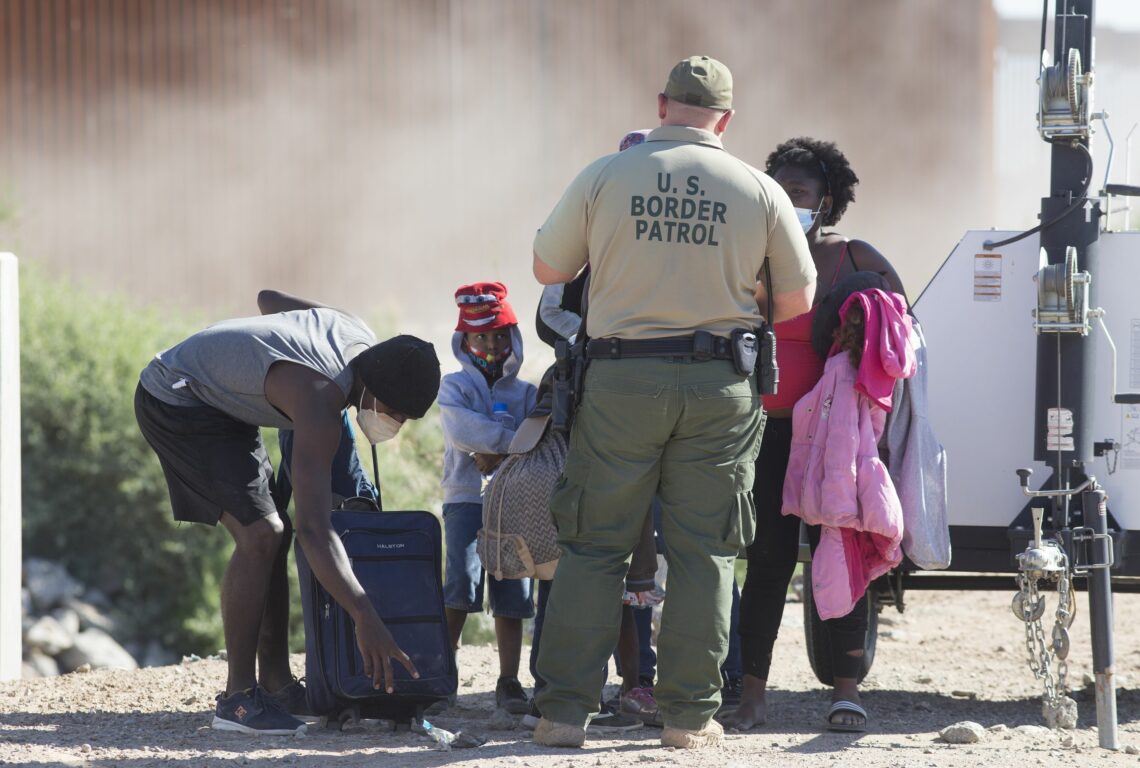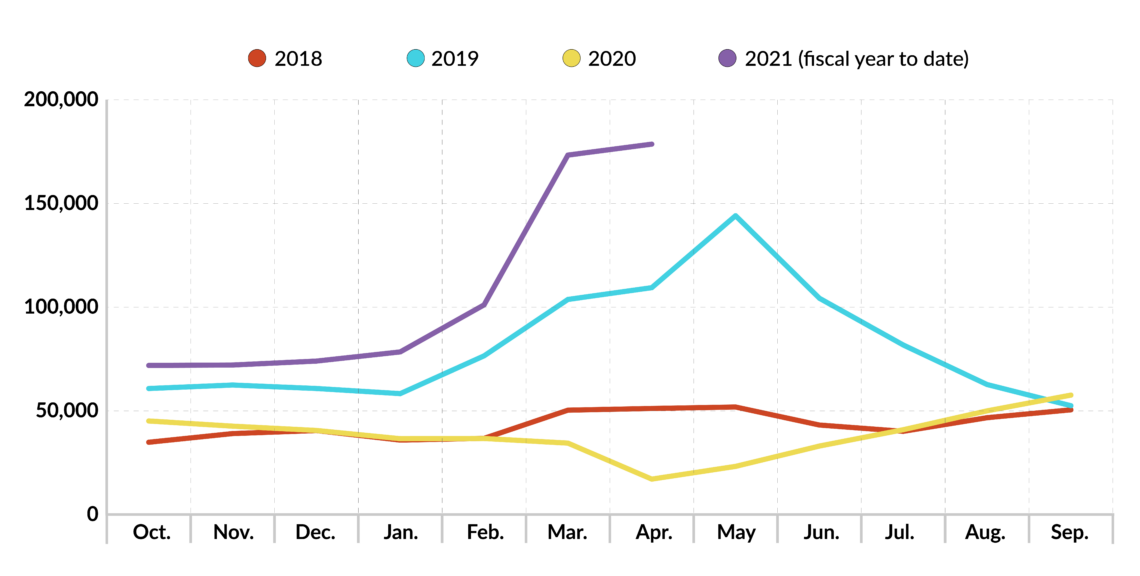Biden’s immigration policies
The new administration has done an about-face on immigration compared with its predecessor. As the public wearies of the problems illegal immigration causes, President Biden could find himself in a bind.

In a nutshell
- President Biden has made big changes to U.S. immigration rules
- The number of people trying to get into the country has surged
- The issue could turn Americans against the president’s party
United States President Joe Biden’s border and immigration policies have become some of the most controversial initiatives of his fledgling administration. Despite the contentious reactions to the president’s moves, there are few signs that the White House plans any significant adjustments in the near term. The situation could break either way for the Biden team, strengthening their dominance in national politics or hamstringing the president’s domestic agenda. Regardless, in the future border security and immigration could become a dividing issue for Americans on cultural, economic, political and security matters.
Policy shifts
President Biden’s policies are far removed from those of the previous administration. Under U.S. law, the executive branch has considerable latitude in how it handles immigration and border security. The previous administration opted for strong measures, including building a physical wall across prominent smuggling routes on the U.S.-Mexico border, closing loopholes that accounted for rising refugee status claims and aggressively deporting aliens unlawfully present in the U.S.
For its part, the Biden administration announced the suspension of border-wall building activities, brought back a more liberal approach to granting asylum requests; reinstituted procedures where many detained aliens were released into the U.S. pending an appearance before an immigration court; and curtailed the deportation of aliens unlawfully present in the U.S.
After Mr. Biden assumed the presidency, there was a dramatic spike in illegal immigration crossings at the U.S.-Mexico border.
Illegal border crossing began to increase after the national elections in anticipation that the new president would adopt more open immigration and border policies. After Mr. Biden assumed the presidency, there was also a dramatic spike in illegal crossings at the U.S.-Mexico border. The number of crossings and those permitted to enter the country grew dramatically over the first quarter of the year. The U.S. government took into custody about 400,000 people on the southern border. Other aliens entered the country illegally but were not detained by U.S. officials.
Border crisis
This spike included many unaccompanied minors, at one point over 17,000 a month. Under U.S. law, unaccompanied underage migrants have to be transferred to the custody of the Department of Health and Human Services (HHS), who must provide for them until a suitable sponsor can be found. These detentions have drawn the most media attention.
The surge at the border triggered a highly partisan debate over whether the conditions constituted a “border crisis.” The administration claimed the uptick was seasonal – an assertion that is demonstrably misleading. While illegal border crossing does vary with the seasons, increasing in more temperate weather, the number of attempted illegal crossings is at a 15-year high. Further, the administration has blamed environmental conditions, including drought and other factors as the “root cause,” for mass migration from Central America.
Facts & figures

The president’s critics place the blame solely on the dramatic shift in policy. Mexico and the countries in Central America have registered similar complaints. Mexican President Manuel Lopez Obrador, for instance, has stated publicly that President Biden’s policies have driven the perception that it is “easier” to cross the border into the U.S.
Response to the surge
The Biden administration has spent funds to discourage illegal border crossing via social media and other means in Latin America. It has also pledged to work with and invest in Latin American countries to address the root causes of illegal immigration. None of these efforts have had an impact on migration flows so far.
Moreover, the U.S. has spent over $3 billion on increasing capacity to house illegal immigrants and transfer them to the interior of the country. The administration recently touted a decrease in the number of unaccompanied minors in the custody of the Department of Homeland Security (DHS), which is responsible for operational control of the border. But the drop is mostly due to the quicker transfer of minors to HHS custody.
The Biden administration has decreased the deterrence to illegal immigration and shows no signs of altering that policy.
The Biden administration has curtailed DHS deportations of illegal aliens by more than 90 percent. At the same time, it has proposed only a scant increase for the DHS budget, not even covering the cost of inflation, while directing significant funds to accommodate the flow of illegal migration. In effect, the administration has decreased the deterrence to illegal immigration and shows no signs of altering that policy anytime soon.
Reactions to lax enforcement
Critics of rising illegal migration have voiced several complaints. More illegal immigration poses a public health risk, especially while Covid-19 is still a major concern. The higher flows also could drive increased transnational criminal activity and boost competition for jobs at a time when U.S. unemployment remains stubbornly high and job growth is slow. There is also a fiscal burden that comes with new waves of illegal immigrants entering communities across the U.S.
The administration has received support from sympathetic media and political groups that favor liberal immigration policies. Nevertheless, polling demonstrates public support for President Biden’s policies is weak. While Americans remain generally pro-immigration, they oppose illegal immigration. Republicans overwhelmingly reject Mr. Biden’s policies, while independents lean heavily against them. Even Democrats, though fiercely loyal to President Biden, when asked about specific policies tend to favor “securing the border.” The Democrats’ key Hispanic and Black constituencies are also skeptical of the Biden administration’s policies,
President Biden has accomplished virtually all of his immigration policies through administrative measures.
Mr. Biden has introduced or backed legislation to further liberalize migration policies, including granting amnesty for undocumented immigrants. There are also bipartisan legislative initiatives meant to help “ease the throughput of illegal immigrants,” including providing free legal aid. These proposals are unlikely to pass in Congress. On the other hand, the president may not invest great effort in pushing them, since he has accomplished virtually all of his policies through administrative measures.
Scenarios
In the near term, the potential for board bipartisan compromise on addressing migration flows is extremely low. And there appears to be zero chance that the Biden administration will dramatically reverse course anytime soon. The momentum is just too strong.
There are always wild cards, like a dramatic national security incident at the border that might trigger overwhelming public pressure to clamp down on illegal immigration. This incident would, however, need to be momentous, perhaps on the same scale as the 9/11 terrorist attacks.
Where immigration and border matters could have the biggest impact is in determining the fate of the president’s domestic agenda. The issue is sowing distrust in the administration’s management of domestic affairs and that could undermine support for its ambitious legislative agenda. Paired with slow economic growth, immigration controversy could put a drag on support for Democratic candidates in the upcoming midterm elections, perhaps costing the president’s party control of Congress.
Failure of the president’s domestic agenda and defeat in the midterm elections could hamstring the administration and spark a retrenchment on border and immigration policies. It is a very possible scenario.







